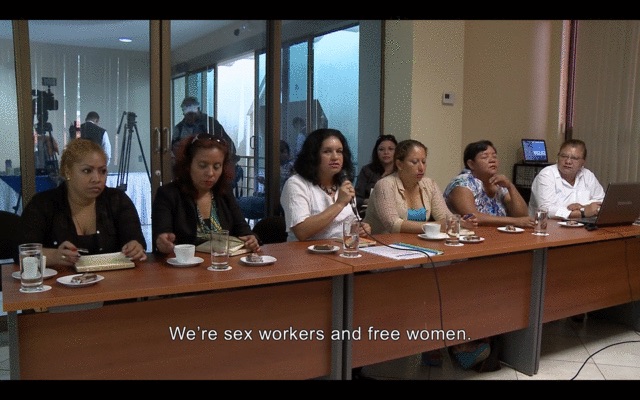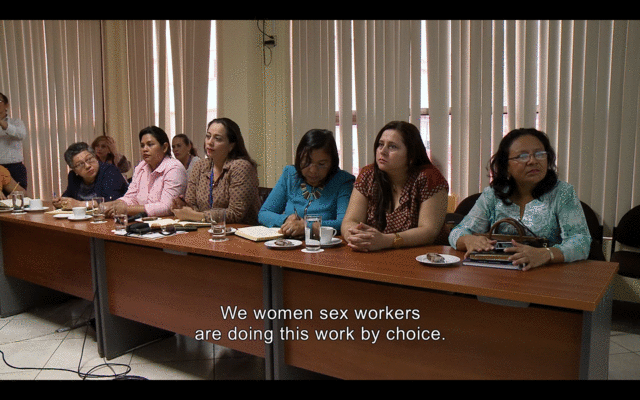
Nicaragua has found a new way to protect sex workers
How do you protect workers in a sector infamous for human rights abuse?
Sex workers rights are human rights, Amnesty International argued in a recent report. Sex workers worldwide are at constant risk of abuse. Countries around the world are struggle to come up with a solution, but one small Central American country has come up with an interesting approach.
Nicaragua recently gave legal power to 18 of its 14,486 sex workers to act as mediators finding solutions to problems facing their communities without having to rely on police.
In 2015 Nicaragua's new program to accredit these sex workers as "judicial facilitators" drew the attention of the French filmmaker Florence Jaugey. For four months, Jaugey's crew trailed the judicial facilitators from the Sunflowers of Nicaragua sex workers' collective, headed by María Elena Dávila, to produce the documentary that bears the collective's name. Girasoles de Nicaragua (Sunflowers of Nicaragua) premiered in Managua in January and is now making waves around Latin America and worldwide.
We caught up with Jaugey and Dávila to ask them some questions about Girasoles and how the judicial facilitator program is helping some of Nicaragua's most vulnerable workers fight against abuse and discrimination.

How did this program start?
Maria Elena: Since 2009 our organization has been involved in conflict resolution. Previously we’d had problems with the authorities, with institutions and with individuals related to discrimination, violence and harassment. Like in every country, sex workers had a bad image, so we decided to organize.
In 2015 the vice president of the Supreme Court of Justice asked if we wanted to be judicial facilitators. I had no idea what that even was. While we’d be doing this work before this, it was very difficult because people didn’t want to open the door for us. Now we are accredited. We have a license signed by the president of the Supreme Court to mediate small conflicts. There are 18 of us and we do this voluntarily, accompanying, counseling, and mediating in minor cases. This can include problems with neighbors and problems with families.
“They have a strength and I think you can see it in this documentary ”
Why use sex workers and not professional mediators?
Florence: The mediation program first existed in rural areas, and then they transplanted it to the city. For example, there are mediators in market places, because there are lots of conflicts that can be resolved within the market, and the facilitators there are leaders from the market. Likewise with sex workers – who knows their work environment better than they do? It's a way to solve problems from inside.
That was the starting point. But now the opposition party will say this government is trying to make itself look good with the sex workers because the program seems so liberal. But the women themselves are also taking advantage of any opportunities given by the government.
A space opens up and they walk right in. That's brilliant, no? They have a strength and I think you can see it in the documentary, their capacity for struggle and integration.
Does it work? Could it work in other countries?
Maria Elena: That’s the objective. Judicial facilitators exist in lots of countries but not in our sector, so we compañeras (which roughly translates as comrade) are serving as an example of how other sex workers can enter this new space. And the film will help them a lot. Plus this April 20th our program has its second anniversary but just in 2015 we addressed 412 cases – which means that we are helping resolve the problems of our sector. If we look at the numbers we are saving the judicial system a lot of money with the contributions we’re making.

Florence, how do you compare attitudes towards sex work here in Nicaragua with those you've seen in Europe?
Florence: There's always been stigmatization of sex workers, ever since Mary Magdalene – they are either the "bighearted whore" or the poor, drugged, disease-riddled, "bad" woman. And I don't think people's view of them is different here in Nicaragua than in other parts of the world. Compared with Sweden or France, where they've passed laws imposing fines on clients, it's more open. At least there's not this 'politically correct' idea of "Oh, poor things, they are victims, so we won't fine them, we'll fine the client because it's the client's responsibility."
The main problem seems to be that sex workers have a lack of labor power and face lots of discrimination. How are you tackling those issues?
Maria Elena: Unfortunately we women attract discrimination from the moment we’re born. That’s a general problem, not just in my country. And you know that we sex workers break the moral codes – I’d call them double standards – and so there will always be sectors that won’t accept you.
Nicaragua has changed a lot. We used to arrive at police stations to make a report and they’d say things like, “It’s good that this happened to you because you were out in the street at night.” But if a client showed up to report that a compañera had robbed him they’d arrest her immediately. Now that happens less because we’re there to defend the compañera.
But we know it’s a process and we can’t change everyone as there are people with deep-rooted habits, Christian beliefs, moralists… but the new generations are going to come up under different circumstances.
And also we’re – we’ve been accepted by the Confederation of Self-Employed Workers and they are guiding us. It’s a slow job. According to government statistics Nicaragua has 14,486 sex workers, and we’ve reached just 2,300 of them. But we know that just like we’ve achieved other things in these past nine years, we’ll achieve this in the end.
So how did the documentary come about?
Florence: Well, I read in the news that the sex workers had been accredited by the Supreme Court of Justice as judicial facilitators. I knew about the judicial facilitators program already. It was a program to resolve problems in rural areas through mediations by local leaders trained by the Supreme Court to reduce the weight on the police and the judicial system. When I realized that the sex workers had also been given this responsibility obviously it interested me. I spoke with Maria Elena, she was open to me but very suspicious, because they really distrust the media.
Maria Elena: Yes, I was suspicious because, you know, it’s been such a process for the media to accept us. Most media is only interested in sensationalism and we’re used to people approaching us only to then do things against us or reveal our private lives and we’re opposed to that.
Is the film getting a lot of publicity in Nicaragua?
Maria Elena: Yes, a huge amount. We premiered it here on 16 January and had invited more than 300 people and everyone came. I was shaking because I didn’t know how people would react at the end, but everything was so positive. Also I’m in a sex workers’ network for Latin America and the Caribbean and the compañeras there are going to use the film internally in each country.
It seems set to make its mark abroad as well!
Florence: It's a unique case in the world that the justice authorities have given this responsibility to these women. But also the success of this film is not just due to Nicaragua and the state of the law here, it's also due to the goodwill of these women. Really the fact that they got this far is because they've fought for it.
Maria Elena: Honestly, we did the film for 3 reasons. One was to change the image of who we are as sex workers. Secondly, to try to raise awareness and civilize our society to challenge that stigma against us. And third, so that people everywhere see that we are women with capabilities and we’re contributing to justice in our country.



